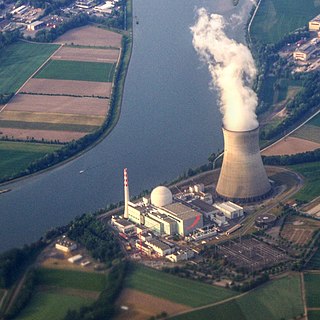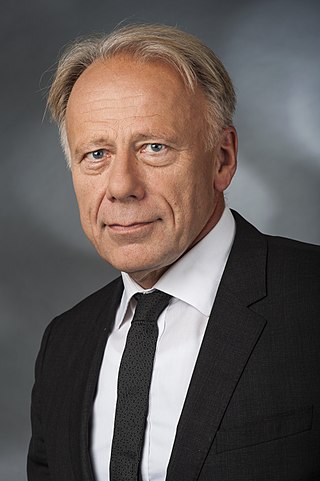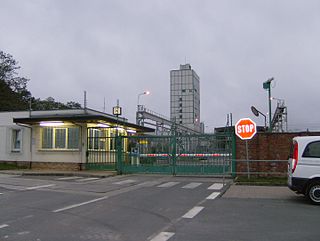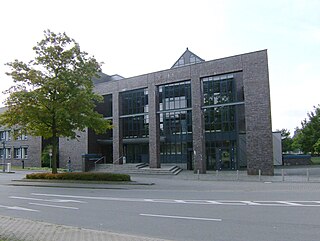Related Research Articles

Nuclear power is the use of nuclear reactions to produce electricity. Nuclear power can be obtained from nuclear fission, nuclear decay and nuclear fusion reactions. Presently, the vast majority of electricity from nuclear power is produced by nuclear fission of uranium and plutonium in nuclear power plants. Nuclear decay processes are used in niche applications such as radioisotope thermoelectric generators in some space probes such as Voyager 2. Generating electricity from fusion power remains the focus of international research.

Jürgen Trittin is a German Green politician. He was Federal Minister for the Environment, Nature Conservation and Nuclear Safety in the government of Chancellor Gerhard Schröder from 1998 to 2005 in Germany.

Fortum Oyj is a Finnish state-owned energy company located in Espoo, Finland. In addition to Finland, it focuses on Germany and other countries in Central Europe, Great Britain, Russia and the Nordic region. Fortum operates power plants, including co-generation plants, and generates and sells electricity and heat. The company also sells waste services such as recycling, reutilisation, final disposal solutions and soil remediation and environmental constructions services, and other energy-related services and products e.g. consultancy services for power plants and electric vehicle charging. Fortum is listed on the NASDAQ OMX Helsinki stock exchange.

E.ON SE is a European electric utility company based in Essen, Germany. It runs one of the world's largest investor-owned electric utility service providers. The name comes from the Latin word aeon, from the Greek aion which means age. The company is a component of the Euro Stoxx 50 stock market index, DAX stock index and a member of the Dow Jones Global Titans 50 index.
RWE AG is a German multinational energy company headquartered in Essen. It generates and trades electricity in Asia-Pacific, Europe and the United States. The company is the world's number two in offshore wind power and Europe's third largest in renewable energy. In the 2020 Forbes Global 2000, RWE Group was ranked as the 297th -largest public company in the world.

A deep geological repository is a way of storing hazardous or radioactive waste within a stable geologic environment. It entails a combination of waste form, waste package, engineered seals and geology that is suited to provide a high level of long-term isolation and containment without future maintenance. This will prevent any radioactive dangers. A number of mercury, cyanide and arsenic waste repositories are operating worldwide including Canada and Germany and a number of radioactive waste storages are under construction with the Onkalo in Finland being the most advanced.
Nuclear power in the United Kingdom generated 16.1% of the country's electricity in 2020. As of August 2022, the UK has 9 operational nuclear reactors at five locations, producing 5.9 GWe. It also has nuclear reprocessing plants at Sellafield and the Tails Management Facility (TMF) operated by Urenco in Capenhurst.

Nuclear power in Germany accounted for 13.3% of German electricity supply in 2021, generated by six power plants, of which three were switched off at the end of 2021, the other three due to cease operation at the end of 2022 according to the complete nuclear phase-out plan of 2011. However, in early 2022 this plan was called into question once more in light of the 2022 Russian invasion of Ukraine which threatens Germany's supply of natural gas. There have been calls to either delay the shutdown of the remaining three reactors or to restart operation in those reactors that were shut down in late 2021.

Nuclear power construction costs have varied significantly across the world and in time. Large and rapid increases in cost occurred during the 1970s, especially in the United States. Recent cost trends in countries such as Japan and Korea have been very different, including periods of stability and decline in costs.

The nuclear power station Mülheim-Kärlich lies on the Rhine, about 10 km northwest from Koblenz, close to the town Mülheim-Kärlich in Germany. The operating company was Société Luxembourgeoise de Centrales Nucléaires, a daughter company of RWE. It was the only nuclear power plant in the Rhineland-Palatinate after it was finished in 1986, however, due to problems with the building permit it only operated for 3 years and was taken offline in 1988. Subsequent attempts to bring the plant online continued until 1998 when the supreme court ruled for it to never be restarted.
Nuclear power in the European Union accounted for approximately 26% of total electricity production in 2019 and nearly half of low-carbon energy production across the EU.
Romania currently has 1,400 MW of nuclear power capacity by means of one active nuclear power plant with 2 reactors, which constitutes around 18% of the national power generation capacity of the country. This makes Romania the 24th largest user of nuclear power in the world.

The Morsleben Radioactive Waste Repository is a deep geological repository for radioactive waste in the Bartensleben rock salt mine in Morsleben, Börde District, in the federal state of Saxony-Anhalt, Germany.

The Bundesamt für Strahlenschutz (BfS) is the German Federal Office for Radiation Protection. The BfS was established in November 1989; the headquarters is located in Salzgitter, with branch offices in Berlin, Bonn, Freiburg, Gorleben, Oberschleißheim and Rendsburg. It has 708 employees and an annual budget of around 305 million Euro (2009). Since 2009 the BfS is also responsible for the storage site of radioactive waste, Schacht Asse II.
Belgium has two nuclear power plants operating with a net capacity of 5,761 MWe. Electricity consumption in Belgium has increased slowly since 1990 and in 2016 nuclear power provided 51.3%, 41 TWh per year, of the country's electricity.

The Jinshan Nuclear Power Plant or Chin Shan Nuclear Power Plant (金山核能發電廠), First Nuclear Power Plant, is a nuclear power plant being definitely shutdown in Shimen District, New Taipei, Taiwan. Commissioned in 1978, the plant was Taiwan's first and smallest nuclear power plant.
Climate-Alliance Germany is a network of more than 120 civil society organizations, including environment groups, development groups, churches, organisations from the fields of youth, education, culture and health, as well as trade unions, and consumer associations. Founded in 2007, the aim of the Alliance is to provide a common front to apply pressure to German decision-makers to adopt climate protection measures. Prominent members include WWF, BUND, and the trade union ver.di.

André Berghegger is a German politician of the Christian Democratic Union (CDU). From 2006 to 2013, he was mayor of the city of Melle.

Nina Scheer is a German lawyer and politician of the Social Democratic Party (SPD) who has been a member of the Bundestag since 2013. Her political interests include energy policy and climate change. In 2019, Scheer was an unsuccessful candidate in the 2019 Social Democratic Party of Germany leadership election, in a team with Karl Lauterbach. Her father was Hermann Scheer, also a SPD Bundestag member.
Sebastian Schäfer is a German economist and politician of the Alliance 90/The Greens who has been serving as member of the Bundestag since 2021.
References
- ↑ "Germany is closing all its nuclear power plants. Now it must find a place to bury the deadly waste for 1 million years". CNN. 30 November 2019.
- ↑ "German utilities buy out of nuclear waste liability for 23.6 bln euros". Clean Energy Wire. 2016-10-19. Retrieved 2018-08-07.
- ↑ Drozdiak, Natalia; Busche, Jenny (2015-03-22). "Germany's Nuclear Costs Trigger Fears". Wall Street Journal. ISSN 0099-9660 . Retrieved 2018-08-07.
- ↑ Reuters Editorial. "EU approves German fund for managing radioactive waste". U.S. Retrieved 2018-08-07.
- ↑ "German Utilities Get Long-Sought Deal on Nuclear Storage". Bloomberg.com. Retrieved 2018-08-07.
- ↑ "Responsibility for German Nuclear Waste Shifts With Creation of State-owned Fund | Latham.London | Latham & Watkins". Latham.London. 2017-07-18. Retrieved 2018-08-07.
- ↑ "Germany readies $26 billion fund for nuclear waste disposal". The Seattle Times. 2016-10-19. Retrieved 2018-08-07.
- ↑ Energie, Bundesministerium für Wirtschaft und. "Kernkraftwerksbetreiber haben Einzahlungen an nuklearen Entsorgungsfonds in Höhe von rd. 24 Milliarden Euro geleistet". www.bmwi.de (in German). Retrieved 2018-08-07.
- ↑ "Deutschland erzielte 2017 dank Atomfonds Rekordüberschuss - derStandard.at". DER STANDARD. Retrieved 2018-08-07.
- ↑ "F.A.S. exklusiv: Atomfonds will nachhaltig anlegen". FAZ.NET (in German). ISSN 0174-4909 . Retrieved 2018-08-07.
- ↑ "Clifford Chance | Clifford Chance berät ersten deutschen Staatsfonds zur Finanzierung der kerntechnischen Entsorgung". Clifford Chance. Retrieved 2018-08-07.
- ↑ "Atomfonds: Was mit dem Geld von Eon und RWE passieren soll - manager magazin". manager magazin. Retrieved 2018-08-07.
- ↑ "Sustainability CIO to head Germany's nuclear phase-out fund". Modern Investor. Retrieved 2018-08-07.
- ↑ "Atommüll-Finanzierung: Staatlicher Atomfonds verliert wegen Negativzinsen auch nach einem Jahr noch Geld" (in German). Retrieved 2018-08-07.